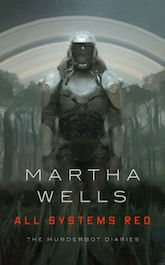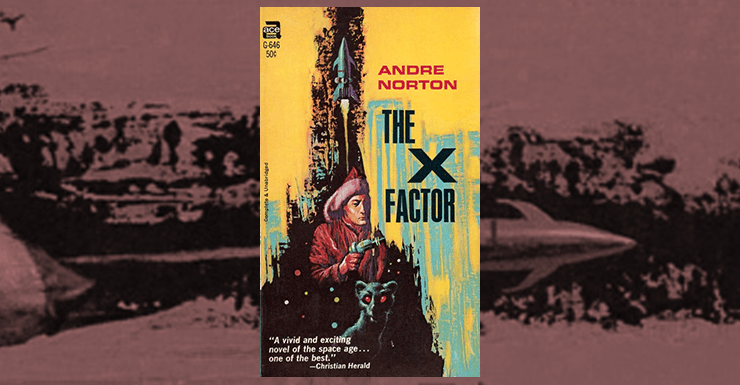As concept fiction goes, The X Factor isn’t bad. We’re well along in the adventure when she tells us what the title means, and by extension what the book is about:
[T]he X factor: that which comes of itself to throw askew equations, speculations, lives, history, that unknown twist or turn of small events that changes a man’s personal future, the work he would do, or the future of a people and an empire from one possibility track to another…. [T]he X factor arises to make the simple complex, all calculations wrong.
There are a lot of other ways to describe this phenomenon, from the cosmic—Mercury retrograde, anyone?—to the individual: luck, coincidence, sudden twists and plot reversals. But for this novel, it’s a person: Diskan Fentress.
Diskan is another classic Norton protagonist. His father was one of the elite of the Survey, a First-In Scout. His mother died giving birth to him, months after his father left her to return to space. He’s an atavism, a poorly coordinated giant whom we would now call non-neurotypical. Others, often including Diskan, consider him to be developmentally disabled, but his disability has more to do with processing than with actual intelligence.
He endures a childhood and adolescence of poverty, abuse, and hard labor, until finally his father comes to rescue him. When the story begins, Diskan is living in luxury on a beautiful planet with his father and stepmother and step-siblings. Finally he has a home and a family, and he can live in comfort.
That would normally be the happy ending, but Diskan is miserable. He doesn’t fit in anywhere on this elegant, refined, delicately lovely planet. He crashes through it, breaks priceless treasures, but worst of all, is treated with nothing but kindness and patience.
Disability activists will tell you this is pretty accurate. When everyone is ever so patient and ever so helpful, the disabled person has no trouble picking up the undertone of pity and condescension. The harder the nice ableds try to “help” the disabled, the more disabled he feels.
Buy the Book


All Systems Red: The Murderbot Diaries
Finally Diskan can’t take it anymore. He lifts a more or less random navigation tape from his father’s collection of worlds he’s discovered, steals a spaceship, and launches himself into the complete unknown. It’s an act less of courage than of suicidal desperation.
The ship crashes on a world locked deep in winter. Eventually he learns that it’s been named Mimir. In the meantime he has to survive the vagaries of weather, geography, and alien fauna, further complicated by the presence of the spacefaring outlaws called Jacks, and the remnants of an archaeological expedition led by a high-ranking Zacathan and his adopted human daughter.
They’re all there for the Forerunner ruins and the mysterious treasure that both the Jacks and the archaeologists are hunting. Nobody knows what that is, except that it must be immensely valuable.
Diskan is still a misfit, but away from his oh-so-understanding family, he starts to grow into himself. This is not an easy process. Diskan trusts no one, including himself.
Although he has always considered himself a failure as a telepath, he has a gift for communicating with animals. This gift draws the telepathic “brothers in fur” to him, but he spends most of the book adamantly refusing to let himself be absorbed into their group mind.
The brothers in fur have their own issues with whether it’s worth it to keep trying, but a sizable faction persists. They’re looking for a return to an ancient symbiosis between humans (or humanoids) and animals. This, as far as we or Diskan can tell, is literal: if he allows the bond, he’ll either travel back in time or bring the past into the present and restore an ancient city to life. It’s never quite clear, at least in this book, which it is.
Diskan’s role as X factor or cosmic spoiler takes time to develop. He’s here completely without intention or choice—all he wanted to do was get away. All the other sentients on the planet have goals and plans and purposes that bring some into alliance and others into deadly conflict. Diskan just wants to live in peace and quiet, preferably very far away from anyone else.
He would very much like to fit in somewhere, but he doesn’t have much hope of that unless he lets himself connect mentally with the brothers in fur. Most of the center of the book consists of Diskan wandering around refusing to make the connection, with alarums, excursions, and the occasional ravening monster. This being a Norton book means much of this perambulating happens underground. It also means that Diskan turns out to be exceptional after all; he reunites the brothers in fur with their ancient human partners, and joins them in a world that might be real and might be a hallucination.
He doesn’t care. All that matters to him is that he’s finally found a place to belong.
I faintly remember reading this novel. When I reread it, I remembered the name Fentress, and I particularly remembered the Zacathan. I had always had a dim memory of these immensely long-lived reptilian aliens, but so far in this reread, I hadn’t found the one I recalled. Sure enough, Hist Techneer Zimgrald was the one I’d had in mind.
He spends most of his scenes either unconscious or being laboriously carried from one danger to the next, but when he is awake, he’s as wise and calm as I remembered. He’s by far my favorite character in the book, though the brothers in fur are very cool. They aren’t really portrayed as individuals however, and Zimgrald is very much his unique self.
I can’t say the same of his daughter Julha. Julha is human, and she’s a bog-standard Sixties chick. She’s tiny, helpless, demanding, and frequently cranky. Diskald does all the literal heavy lifting and Zimgrald does most of the heavy thinking. Julha mostly just bitches Diskan out and fusses over Zimgrald.
She’s a disappointment after Karara in Key Out of Time and in the context of the Wyverns and the Witches of Estcarp. It seems Norton was going through a phase, because the twins in Quest Crosstime, likewise published in 1965, have a similar tendency to be annoying and physically useless.
Still, Diskan is interesting, and for the time he’s a good portrait of a non-neurotypical person. It’s interesting too that the brothers in fur do much of the manipulating and controlling of humans and supposedly superintelligent aliens. Norton had been working through some thoughts about the relationship between humans and animals.
Here she puts the animals in charge, and lets us feel their frustration with the sheer stubborn obtuseness of the human mind (and its propensity for believing itself superior to the rest of the universe). Zimgrald being himself a telepath, though he can’t communicate on that frequency, has a better sense of what the brothers in fur are capable of. He serves as a reality check for the humans, and he helps lead Diskan toward acceptance of the bond with the brothers in fur.
I’ll be reading The Sioux Spaceman next. It was the first of this series to be published, in 1960, but chronologically it comes after The X Factor. I’m braced for it to be Of Its Time in its portrayal of Native Americans, and there will probably be no live or speaking females in the universe. But we’ll see.
Judith Tarr’s first novel, The Isle of Glass, appeared in 1985. Her most recent novel, Dragons in the Earth, a contemporary fantasy set in Arizona, was published by Book View Cafe. In between, she’s written historicals and historical fantasies and epic fantasies and space operas, some of which have been published as ebooks from Book View Café. She has won the Crawford Award, and been a finalist for the World Fantasy Award and the Locus Award. She lives in Arizona with an assortment of cats, a blue-eyed dog, and a herd of Lipizzan horses.










